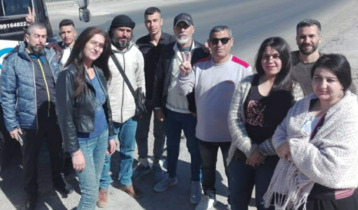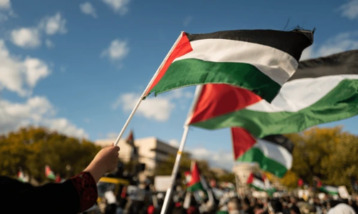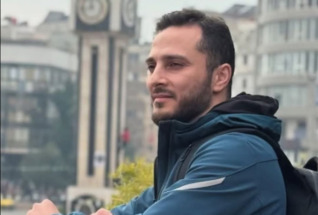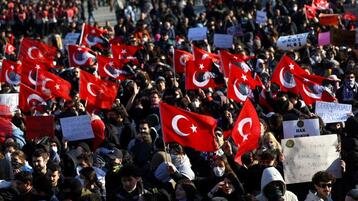-
The Forgotten Internal Immigrants

Forcibly displaced persons, refugees, asylum seekers, victims of persecution
is the category of citizens who were forced to leave their places of residence in order to
avoid the negative consequences of an armed conflict.
Every 113 people in the world belong to the displaced persons category.
UN HighCommissioner for Refugees Filippo Grandi having stated "This number is
unacceptably huge, and indicates the need to show solidarity and to achieve prevention
and crisis management, and the necessity to step up assistance and protection to
refugees, internally displaced persons and persons seeking asylum".
Ukraine is the top ten in terms of the internally displaced persons. The number
of migrants from Donetsk and Lugansk regions of Ukraine and the Autonomous
Republic of Crimea is still has been increasing. The Ministry of Social Policy of Ukraine
reported that according to the Unified Information Database on Internally Displaced
Persons,as of July 15, 2019, 1 million 391 034 people were registered, including half
of the people retirement age.This is without taking into account the fact that because
of the conflict affected not less than 4.4 million men,women and children. Most of them
need legal aid for processing documents, receiving social benefits and pensions, as well
as compensation of destroyed or damaged property.
Ukraine needs legal certainty on this issue. At the legal level, today there is no
mechanism for compensation of destroyed or damaged housing. Until now, state bodies
do not yet have the political will to develop a legislative extra-judicial compensation
mechanism while violating the constitutional rights of citizens (Article 47 of the
Constitution of Ukraine everyone has the right to housing). At present,
only a judicial form of rights protection is possible, where the court,
in the absence of legal support, refuses to meet the requirements.
Housing for migrants is a complex issue. There is no nation-wide special
program whereby internally displaced people can purchase housing. All programs
they can use are general and designed for several preferential categories. For example,
for ATO participants, young families, "Affordable Housing" is 50/50. The absence of
a unified mechanism to the protection and support of the IDP leads to a violation
of the human rights to a fair trial guaranteed by the Constitution of Ukraine and
Article 6 of the European Convention on Human Rights. Certainly, this is able to
lead to the massive claims to the ECtHR.
First, given the specifics of the ECtHR case review, one cannot hope that it
will be fast. At least 5-8, or even 10 years under consideration. Secondly,
in December 2018, the ECtHR made a statement that pending determination
of jurisdiction, which of the two powers Ukraine or Russia, individual complaints
would not be considered. This does not deprive peoples’ right to apply to the
ECtHR, but until an interstate dispute is resolved, individual complaints will simply
lie in the ECtHR.
The latest history is known for such cases of unrecognized territories where
the Russian Federation played no role.
In Azerbaijan, the 1987-1994 war led to the 1991 referendum. By voting
99.89% has formed the Nagorno-Karabakh Republic, which is still not recognized by
the world. About 350 thousand displaced persons. In 1999, the Law "On Social
Protection of IDP and Equal Persons" had been adopted. This Law supplemented the
Laws "On Citizenship" and the Law "On the Status of Refugees and IDP", which
measures provided to the social protection of refugees - from provision of temporary
housing to tax, transport, housing, medical benefits and labor provision.
Since 2005, the state program of improving the living conditions of refugees
and IDP, and ensuring employment has supplemented it.
Russia's interference in Georgia's domestic policy led to the loss of the two
territorial units. Because of the South Ossetia War of 1991-1992 and the referendum,
98% of Ossetia voted for independence and joining the Russian Federation.
The self-proclaimed Republic of South Ossetia was formed. In 1992-93, armed conflict
in Abkhazia led to the separation from Georgia, and 200,000 ethnic Georgians - IDP.
In 1992, a Committee on Refugees and Migration was stablished in Georgia,
whose duties included registration, resettlement, receipt and distribution of
humanitarian assistance. In 1996, the Committee was transformed into a ministry.
Today it is called the Ministry of Forced Migration, Occupied Territories, Resettlement
and Refugees.
08/08/2008 The Georgian parliament signed a resolution recognizing the
occupation of South Ossetia and Abkhazia by the Russian Federation, and then
admitted it as a military occupier.
Due to the attraction of funds from international donors, Georgia managed
to provide a significant part of IDP with housing. The European Union has allocated
EUR 43.5 million to the needs of the Georgian settlers, whereas 27 were spent on
housing construction. USAID provided the Georgian authorities with $42 million,
most of which were intended for home improvement and the construction of
new centers.
June 5, 2019, the Georgian diplomatic service defending the fundamental
rights of IDP as a result of ethnic cleansing at the 73rd session of the United Nations,
The UN issued a resolution on the status of IDP and refugees from Abkhazia and
Techenwal region/South Ossetia, which was supported by a majority of votes,
75 against 15, which obliged the Secretary-General UN to make an annual report
on the status of IDP and refugees in Georgia and to implement the terms of the resolution.
Ukraine has officially declared Georgia's support for refugees and IDP,
but no initiativesto establish its own programs to protect 4.4 million Ukrainian
victims because of Ukraine-Russia armed conflict still does not exist.
Olha Tereshchenko, Ukrainian international lawyer
You May Also Like
Popular Posts
Caricature
BENEFIT AGM approves 10%...
- March 27, 2025
BENEFIT, the Kingdom’s innovator and leading company in Fintech and electronic financial transactions service, held its Annual General Meeting (AGM) at the company’s headquarters in the Seef District.
During the meeting, shareholders approved all items listed on the agenda, including the ratification of the minutes of the previous AGM held on 26 March 2024. The session reviewed and approved the Board’s Annual Report on the company’s activities and financial performance for the fiscal year ended 31 December 2024, and the shareholders expressed their satisfaction with the company’s operational and financial results during the reporting period.
The meeting also reviewed the Independent External Auditor’s Report on the company’s consolidated financial statements for the year ended 31 December 2024. Subsequently, the shareholders approved the audited financial statements for the fiscal year. Based on the Board’s recommendation, the shareholders approved the distribution of a cash dividend equivalent to 10% of the paid-up share capital.
Furthermore, the shareholders endorsed the allocation of a total amount of BD 172,500 as remuneration to the members of the Board for the year ended 31 December 2024, subject to prior clearance by related authorities.
The extension of the current composition of the Board was approved, which includes ten members and one CBB observer, for a further six-month term, expiring in September 2025, pending no objection from the CBB.
The meeting reviewed and approved the Corporate Governance Report for 2024, which affirmed the company’s full compliance with the corporate governance directives issued by the CBB and other applicable regulatory frameworks. The AGM absolved the Board Members of liability for any of their actions during the year ending on 31st December 2024, in accordance with the Commercial Companies Law.
In alignment with regulatory requirements, the session approved the reappointment of Ernst & Young (EY) as the company’s External Auditors for the fiscal year 2025, covering both the parent company and its subsidiaries—Sinnad and Bahrain FinTech Bay. The Board was authorised to determine the external auditors’ professional fees, subject to approval from the CBB, and the meeting concluded with a discussion of any additional issues as per Article (207) of the Commercial Companies Law.
Speaking on the company’s performance, Mr. Mohamed Al Bastaki, Chairman BENEFIT , stated: “In terms of the financial results for 2024, I am pleased to say that the year gone by has also been proved to be a success in delivering tangible results. Growth rate for 2024 was 19 per cent. Revenue for the year was BD 17 M (US$ 45.3 Million) and net profit was 2 Million ($ 5.3 Million).
Mr. Al Bastaki also announced that the Board had formally adopted a new three-year strategic roadmap to commence in 2025. The strategy encompasses a phased international expansion, optimisation of internal operations, enhanced revenue diversification, long-term sustainability initiatives, and the advancement of innovation and digital transformation initiatives across all service lines.
“I extend my sincere appreciation to the CBB for its continued support of BENEFIT and its pivotal role in fostering a stable and progressive regulatory environment for the Kingdom’s banking and financial sector—an environment that has significantly reinforced Bahrain’s standing as a leading financial hub in the region,” said Mr. Al Bastaki. “I would also like to thank our partner banks and valued customers for their trust, and our shareholders for their ongoing encouragement. The achievements of 2024 set a strong precedent, and I am confident they will serve as a foundation for yet another successful and impactful year ahead.”
Chief Executive of BENEFIT; Mr. Abdulwahed AlJanahi commented, “The year 2024 represented another pivotal chapter in BENEFIT ’s evolution. We achieved substantial progress in advancing our digital strategy across multiple sectors, while reinforcing our long-term commitment to the development of Bahrain’s financial services and payments landscape. Throughout the year, we remained firmly aligned with our objective of delivering measurable value to our shareholders, strategic partners, and customers. At the same time, we continued to play an active role in enabling Bahrain’s digital economy by introducing innovative solutions and service enhancements that directly address market needs and future opportunities.”
Mr. AlJanahi affirmed that BENEFIT has successfully developed a robust and well-integrated payment network that connects individuals and businesses across Bahrain, accelerating the adoption of emerging technologies in the banking and financial services sector and reinforcing Bahrain’s position as a growing fintech hub, and added, “Our achievements of the past year reflect a long-term vision to establish a resilient electronic payment infrastructure that supports the Kingdom’s digital economy. Key developments in 2024 included the implementation of central authentication for open banking via BENEFIT Pay”
Mr. AlJanahi concluded by thanking the Board for its strategic direction, the company’s staff for their continued dedication, and the Central Bank of Bahrain, member banks, and shareholders for their valuable partnership and confidence in the company’s long-term vision.
opinion
Report
ads
Newsletter
Subscribe to our mailing list to get the new updates!






















